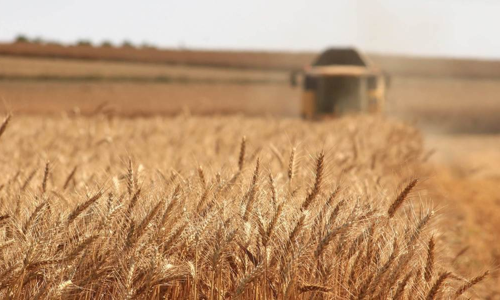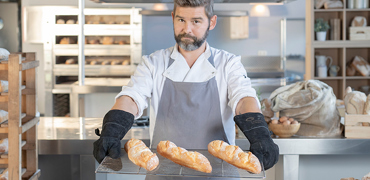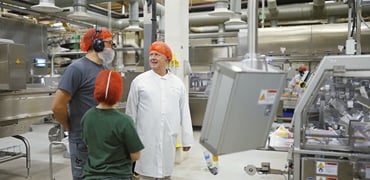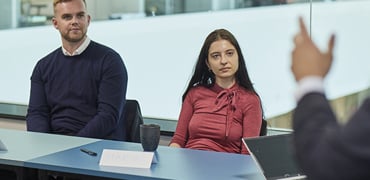“If we can produce more by using less, we are on the right path”

Lantmännen Unibake’s sustainability strategy connect the three pillars Climate, Health, and People in one overarching ambition to “Bake for a Better World”. Here, the Global Sustainability Director, Anna-Karin Wahlgren, reflects on the state of play, and the company’s plans for realizing its ambitious targets.
Anna-Karin, why has Lantmännen Unibake chosen these three pillars as key elements in the sustainability strategy?
“If we start with Climate, it’s obvious for everyone that global warming is not a thing of the future. It’s something that we all experience today. As a big manufacturer of food, we can change how we make and distribute our bread products by sourcing more climate-friendly raw materials, and by implementing optimized equipment, and adapting to new ways of working. If we move on to Health, we have a growing population that is also aging which calls for a healthier lifestyle – a lifestyle we can affect by baking products with more fibre and wholegrain, and with less salt and calories. And then there is the People agenda, where it all begins with creating safe and healthy workplaces, and where we furthermore want to attract and retain both young and seasoned employees because they play an equally important role on the future job market where resources will be few.”
Can you give an example on how the pillars are interlinked?
“Grains and other plant foods are less resource intensive to produce than animal foods like dairy, eggs, and meat. Wholegrains have a strong, healthful nourishment and reduced environmental impact compared to more processed grain products. And when we bake products with less salt and less calories like butter, it is also good for the climate because we use fewer natural resources in the process. If we can produce more by using less, we are on the right path.”
In Unibake you have familial ties with Lantmännen – how does that benefit your sustainability efforts?
“By being part of the Lantmännen group, we have direct access to the whole value chain from field to fork. There is a circular movement from the farmers in the field growing crops and making the flour that we use in our products. There is so much innovation going on in Lantmännen that we can benefit from – the knowledge around sustainable farming, growing more resilient grain types, projects for using bakery waste to make bioethanol, and so on.”
How has the focus on sustainability changed in recent years?
“Not so long ago, sustainability was something businesses – including our own – handled in a separate track disconnected from the main business. Today, sustainability is an essential part of the conversation when we have dialogues internally, with suppliers, with customers, with future employees. I sense that the same thing has happened in a lot of other companies.”
The big question is how. How do you make the necessary changes?
“By incorporating the changes in our key business processes – in our budget process, in our long-term business strategy, in our enterprise risk process and so on. Sustainability must be a part of every conversation we have. In all functions and in all countries. That’s one focus point. Another one is navigating more on data. As part of launching our new strategy, we have invested a lot of resources in our ability to monitor our progress within each pillar in our sustainability strategy. Otherwise, we can’t know if we are moving in the right direction. By taking control of our data, we can make our progress transparent both internally and externally which enables a fruitful dialogue with our stakeholders.”
A brief status – are you on track with the targets you have set?
“If we look at our performance in 2023, we have significantly reduced our Scope 1 and Scope 2 GHG emissions according to the SBTi program that we have committed to. Scope 1 and 2 are the emissions we can control. From a 2019 base year, our target is to reduce absolute Scope 1 and 2 GHG emissions by 50% when we reach 2030. So far, we have reduced our Scope 1 emissions 20% and Scope 2 emissions 47%. That’s good. The main reasons for reaching those reductions have been running energy efficiency projects, optimized food-production facilities, and the purchase of green certificates in the energy market. When it comes to Scope 3 GHG emissions, the climb is steeper, and even if we launched a number of initiatives, it takes longer before we can count the savings. Our target is to reduce Scope 3 emissions 30% by 2030. For us to succeed we need strong partnerships with our suppliers, so we can work together on bringing down emissions across the value chain.”
What is at the top of your sustainability agenda?
“We have the right plans; we know our targets; we know which crucial areas we need to address and in which order. The big unknown is all the moving parts in the transition towards a more sustainable future. For instance, we want to replace ovens running on natural gas with ovens running on electricity. But to make that change the technology must be ready, the energy supply must be there, it must be feasible to build a good business case and so on. Those are some of the things we are looking into.”
What is your key message on sustainability?
“It boils down to one sentence: We need to act together. In Lantmännen Unibake, we can push an agenda and challenge perspectives in the global food system. But we must all play our part. It’s not going to be easy. Which is also what makes this journey so fascinating for us as a company and for me personally and professionally. It’s a challenge. But I’m convinced, we can get there.”















